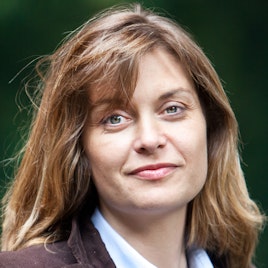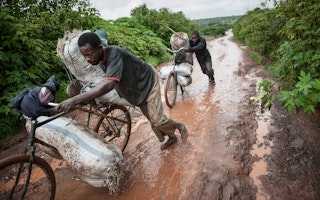EU Election Monitoring in Congo: Pros and Cons
By Marta Martinelli
In November of this year the people of the Democratic Republic of Congo will be called to vote in the second presidential elections since the end of several years of war. As Kinshasa prepares for this momentous occasion, debate is raging in Brussels on whether the European Union should support the much-needed election monitoring.
The 2006 constitution states that the president of the Democratic Republic of Congo is directly elected to a five-year term, renewable once, by universal suffrage. Elections must be organized 90 days before the swearing in of the president in early December.
But so far the road to these elections has been a bumpy one. The voters list has yet to be completed; both donors and government are holding back on their pledges to meet the required budget; the composition of the electoral commission, the national body set up to organize and monitor the elections, has been marred by bitter struggles between the majority and the opposition and does not include civil society representatives; the definition of the electoral calendar has been problematic. There are also already concerns about the impartiality of the commission with questions raised as to who is effectively funding it.
At the beginning of 2011 the Congolese national assembly approved constitutional amendments that eliminate the multi-round run-off vote system used during the 2006 elections. Under the new procedure, the candidate with the largest percentage of votes wins the seat even if the total votes amount to less than 50 percent of the electorate. The result is that a president could be appointed that has been favored by less than 50 percent of the votes cast with aberrant consequences on the “representativeness” of the highest post in the country. The revision has been strongly contested by the opposition, human rights defenders, and civil society. It has also reinforced the “Congo fatigue” within the international donor community.
The government has justified the move by saying that two rounds of elections would cost more than one, but the flip side is that a one-round electoral process is more likely to result in victory by reducing the potential for opposition to organize effectively.
The European Parliament is opposed to an EU international monitoring mission in the DRC for fears that this would represent an implicit endorsement of the controversial, constitutional amendment. European Parliamentarians have also voiced concern over a lack of progress in democratization since 2006 in addition to financial constraints and EU institutional matters.
One wonders, however, how this situation is any different to other countries where the EU has recently monitored equally flawed election processes, namely in Sudan, Uganda, and Nigeria.
Given its emphasis on democracy and good governance, and its sustained presence (albeit with a mixed record) in the DRC, the EU has no excuse to stand idle during elections in Congo. What is needed is a genuine commitment resulting in policy towards Congo that puts democratic progress at the heart of EU’s engagement.
What’s more, an international presence, may be the only possibility for the Congolese to have a frank account of their elections. This in turn may help prevent social unrest and political disputes over end results.
Engagement in election monitoring in the DRC is the only way that the EU can claim any political role in the aftermath of the elections: just imagine if the EU had not participated in election monitoring in Sudan. Would it be now in a position to stand alongside other international actors in influencing local political leaders? What would it signal with regard to EU financed programs in support of civil society, media freedom, good governance, and rule of law in the DRC?
Local civil society finds itself more isolated now than in 2006 when the international community rushed to assist Congo’s first peaceful and democratic election. It stands alone to organize civic education programs, establish platforms, stand up to government, reach out to partners and eventually, monitor the elections. All this while wondering how five years in government were not enough to organize the elections in due time.
The European Union, together with other donors, has an opportunity to be a genuine partner to Congolese civil society and political development as the country yet-to-be-realized multiparty democracy engages in its second test. This means being able to stay engaged in the whole electoral process (rather than just the moment of elections), be prepared to deliver unpalatable messages and follow them up with real commitments.

Until February 2022, Marta Martinelli was head of the EU external relations team for the Open Society European Policy Institute.


